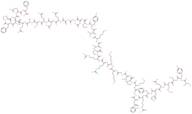
ACTH(1-39) trifluoroacetate
CAS : 12279-41-3
Ref. 3D-FA108368
| 1mg | 656,00 € | ||
| 2mg | 781,00 € | ||
| 5mg | 893,00 € | ||
| 10mg | 1.050,00 € | ||
| 25mg | 1.155,00 € |
Informations sur le produit
- Corticotropin
- L-Seryl-L-tyrosyl-L-seryl-L-methionyl-L-alpha-glutamyl-L-histidyl-L-phenylalanyl-L-arginyl-L-tryptophylglycyl-L-lysyl-L-prolyl-L-valylglycyl-L-lysyl-L-lysyl-L-arginyl-L-arginyl-L-prolyl-L-valyl-L-lysyl-L-valyl-L-tyrosyl-L-prolyl-L-asparaginylglycyl-L-alanyl-L-alpha-glutamyl-L-alpha-aspartyl-L-alpha-glutamyl-L-seryl-L-alanyl-L-alpha-glutamyl-L-alanyl-L-phenylalanyl-L-prolyl-L-leucyl-L-alpha-glutamyl-L-phenylalanine
- Acth(1-39)
ACTH(1-39) trifluoroacetate is a synthetic form of ACTH that is used for the diagnosis of autoimmune diseases and bowel disease. It is also used to assess the function of the adrenal gland in cases of suspected Cushing's syndrome. The blood sampling procedure involves withdrawing a small amount of blood from the patient and adding ACTH(1-39) trifluoroacetate to it, which causes an increase in cortisol concentration. ACTH(1-39) trifluoroacetate binds to corticotropin receptors on cells in the body, causing them to release basic proteins that are responsible for inflammation. This drug may be a potential biomarker for metabolic disorders such as obesity. It has been shown to have anti-inflammatory properties and can be used as a nonsteroidal anti-inflammatory drug (NSAID).
Propriétés chimiques
Question d’ordre technique sur : 3D-FA108368 ACTH(1-39) trifluoroacetate
Si vous souhaitez demander un devis ou passer commande, veuillez plutôt ajouter les produits souhaités à votre panier, puis demander un devis ou passer commande à partir de votre panier. C'est une méthode plus rapide, plus économique, et vous pourrez bénéficier des remises disponibles ainsi que d'autres avantages





